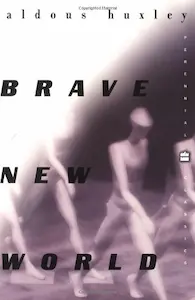Brave New World - Summary
Aldous Huxley

Introduction
In Aldous Huxley’s dystopian novel, “Brave New World,” the author presents a chilling vision of a future society where technology, consumerism, and social conditioning have reached extreme levels. Set in a futuristic London, Huxley explores themes of individuality, freedom, and the dangers of a society driven by pleasure and conformity. This book summary will provide an overview of the key elements of “Brave New World,” highlighting its thought-provoking ideas and captivating narrative.
The World State and Its Citizens
In the novel, Huxley introduces readers to a world dominated by the World State, a totalitarian government that controls every aspect of its citizens’ lives. The society is divided into different castes, ranging from the intellectually superior Alphas to the intellectually inferior Epsilons. Each caste is conditioned from birth to fulfill specific roles and to be content with their predetermined place in society.
The Role of Technology
Technology plays a central role in the functioning of the World State. One of the most striking technological advancements is the creation of humans through artificial means, known as “Bokanovsky’s Process.” This process allows for the mass production of identical individuals, eliminating the need for natural reproduction. Additionally, the citizens are constantly monitored and controlled through advanced technology, ensuring their conformity and obedience to the state.
The Pursuit of Pleasure
In “Brave New World,” pleasure and instant gratification are the driving forces behind society. Citizens are encouraged to seek constant pleasure through the use of a drug called “soma,” which numbs any negative emotions or discontent. The pursuit of physical pleasure is also highly encouraged, with promiscuity being the norm and monogamy being seen as outdated and unnatural.
The Suppression of Individuality
Individuality and personal freedom are suppressed in the World State. Citizens are conditioned to prioritize the needs of the society over their own desires, and any form of dissent or independent thought is discouraged. The concept of family and intimate relationships is also eradicated, as the state believes it leads to emotional instability and disrupts social harmony.
The Savage Reservation
One of the pivotal moments in the novel occurs when the protagonist, Bernard Marx, and his love interest, Lenina Crowne, visit a Savage Reservation. This reservation is a remnant of the old world, where people live in a more primitive and natural state. The stark contrast between the reservation and the technologically advanced World State highlights the dehumanizing effects of the latter.
John the Savage
Within the Savage Reservation, Bernard and Lenina encounter John, a character who embodies the struggle between individuality and conformity. John is raised outside of the World State and has been exposed to literature and ideas that challenge the society’s values. His presence in the novel serves as a catalyst for questioning the oppressive nature of the World State and its impact on human nature.
The Clash of Ideologies
As John becomes exposed to the World State, he becomes increasingly disillusioned with its values and the lack of genuine human connection. His clash with the World State’s Controller, Mustapha Mond, represents the clash between individuality and societal control. Mond defends the World State’s practices, arguing that stability and happiness are more important than personal freedom and individuality.
Themes of Control and Manipulation
Throughout the novel, Huxley explores the themes of control and manipulation. The World State uses various methods, such as conditioning, propaganda, and the suppression of history, to maintain its power over its citizens. Huxley’s portrayal of a society where individuals willingly surrender their freedom in exchange for comfort and pleasure serves as a cautionary tale about the dangers of totalitarian control.
Critique of Consumerism
Huxley also critiques the destructive nature of consumerism in “Brave New World.” In this society, citizens are constantly bombarded with advertisements and conditioned to desire material possessions. The pursuit of consumer goods becomes a substitute for genuine human connection and personal fulfillment, further reinforcing the dehumanizing effects of the World State.
Conclusion
“Brave New World” presents a thought-provoking and cautionary vision of a future society dominated by technology, consumerism, and social control. Through its exploration of themes such as individuality, freedom, and the dangers of a pleasure-driven society, Huxley challenges readers to reflect on the potential consequences of sacrificing personal freedom for societal stability. This dystopian novel serves as a stark reminder of the importance of preserving individuality and critical thinking in the face of oppressive systems.